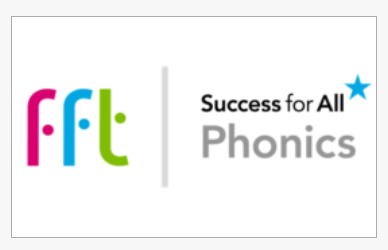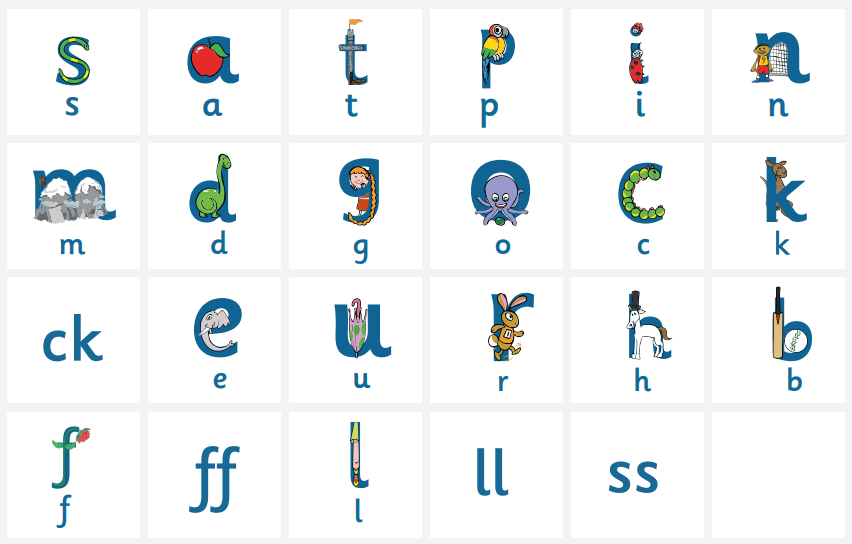Phonics
INTENT
At Welland Academy we are committed to providing great reading provision and developing pupils’ proficiency in, and love of, reading. We ensure that all children have the skills, knowledge and understanding to become confident and enthusiastic readers and writers.
We believe that high-quality phonics teaching improves literacy levels and gives all children a solid base on which to build and develop their reading habits so that they read widely and often for reading and information.

IMPLEMENTATION
Through daily, systematic and consistent high-quality phonics teaching, children learn to blend and segment words for reading and spelling. To allow our children to develop a strong phonic awareness and effective blending, decoding and comprehension skills, we have chosen to use a DfE Validated synthetic phonics programme (SSP) called FFT Success for All Phonics from FFT. The programme supports our intentions to teach children to read and write independently so that they can access a broad and exciting curriculum and flourish as learners throughout their time at our school. Implementation We maintain fidelity in the implementation of our phonics teaching by using FFT Success for All Phonics which allows the children to learn phonics through a highly structured programme of daily lessons across FS/KS1, using a variety of fun activities in multi-sensory and systematic ways. Each session gives an opportunity for children to revisit their previous experience, be taught new skills, practice together and apply what they have learned and celebrate their achievements. It follows the teaching principles of:
• Revisit and Review
• Teach and Model
• Practise and Apply
• Celebrate Achievement and Assess
Time is incorporated to allow for consolidation so that children can secure their skills, knowledge and understanding. The programme is underpinned by a set of seven core principles designed to support all teachers and children.
Core principles:
• Systematic Progression
• Regular Assessment
• Early Intervention
• Multisensory Approach
• Co-operative Learning
• Application of Skills
• Reduced Workload and Collegiate Approach
Reading materials have been designed to support rapid and sustained progress and are well-matched to the scope and sequence of the programme. A comprehensive set of 68 decodable shared readers is provided by the programme and additional materials that a school already has that match the sequence can be used to supplement early reading. The FFT Success for All Phonics Scope and Sequence is set out clearly and provides detailed guidance and support for teachers to plan and deliver high quality lessons. A synthetic approach to teaching ‘pure sounds’ and the skills of segmenting and blending are incorporated into the teaching and learning materials. Lessons are planned so that children build on their skills sequentially and systematically and can be adapted and modified to meet the needs of the children accordingly.
Training and support is offered through FFT Success for All Phonics and FFT and our school support staff through this training offer. All staff are given the skills, knowledge and understanding to deliver high- quality phonics lessons and to achieve strong and sustained pupil outcomes in phonics and early reading and writing.
IMPACT
Through the consistent, systematic and daily teaching of the FFT Success for All Phonics programme, our aim is for children to become fluent, confident readers by the end of Key Stage One. Children are regularly assessed informally by the teacher within the lessons and over a sequence of lessons to ensure they keep up.
If children need additional support, they are provided with keep-up sessions to ensure they stay on track with the rest of the class. More formal assessments are completed every half term using FFT’s Reading Assessment Programme (RAP) which covers all KS1 assessments including phonics skills, decoding, reading fluency, comprehension and the Year 1 phonics screening check.
Children who require further additional support (catch-up) are identified using a range of assessment information and will be supported through small group or one-to-one interventions such as Tutoring with The Lightning Squad, a reading tutoring programme where pupils work in small groups with a tutor to improve their reading skills. The tutoring is a blended approach with face-to-face tutoring supported by an online tutoring platform. The tutoring activities are designed and structured to improve reading skills, fluency, comprehension, spelling and phonics.
At the end of Year 1 children are statutorily assessed using the Phonics Screening Check. This screening check confirms whether the child has met the appropriate phonics standard and can be used diagnostically to identify areas that need further attention going forward. Children who do not meet the required standard will continue their phonics lessons so that they are ready to retake the screening at the end of Year 2.
Through the FFT Success for All Phonics programme and our commitment to phonics teaching, children will be equipped with the skills, knowledge and understanding to decode unfamiliar words using a range of strategies. They will have a firm phonic base to support them on their literacy journey through school. They will develop their fluency and comprehension skills, take pleasure in exploring the rich literary world around them, acquire a love of reading and flourish as readers.
Daily Phonics Lessons in Reception and Year 1
Over the course of 3 terms, your children will cover the first 50 sounds in the developmental progression. The planning is divided into weeks or ‘Steps’ of the programme, with each Step covering a select number of GPCs. FFTs Success for All’s Scope and Sequence document sets this out.
During Term 1, children will learn 3 or 4 new GPCs per week, with the final day of the week being reserved for review and consolidation.
Starting in Term 2, children begin to learn vowel digraphs at a pace of 1 per week
During Term 3, children continue to learn vowel digraphs along with common alternative spellings. The year concludes with 3 weeks of review to consolidate all Reception level content in preparation for Year 1.
To support both teachers and children, the phonics lessons follow a consistent daily structure with clear timing goals for each activity. This consistent approach enables lessons to be taught with pace as everybody understands the routine and what is expected. Each lesson lasts 25 minutes and follows the same basic sequence each day:
• Review of Previously Taught GPCs (10 minutes)
• Teach, Practise and Apply New GPC (15 minutes) Daily Shared Reader Lessons in Reception and Year 1
Shared Readers are fully decodable texts in a wide range of genres that include familiar characters, settings and topics relevant to children of all ages.
Over the course of 3 terms, children will on average read 32 Shared Readers linked to the progression of sounds in their daily phonic lessons. It is important that children don’t simply know their phonics but can apply that knowledge to the skill of reading itself. That’s why the Shared Readers are carefully aligned to the phonics lessons and allow children to practise reading the new and recently taught GPCs as well as the Common Exception Words to which they have been introduced. To support both teachers and children, the Shared Reader lessons follow a consistent daily structure with clear timing goals for each activity. This consistent approach enables lessons to be taught with pace as everybody understands the routine and what is expected. Each Shared Reader is designed to be read over 5 days.
In Reception Term 1, the lesson plans are 15 minutes long, before progressing to 20 minutes in Term 2 and 30 minutes in Term 3 in order to be ready for a full 30-minute session in Year 1. This is partly to accommodate the increasing length of the texts, as well as the introduction of sentence writing.
In addition, the five-day schedule also provides opportunities to develop comprehension, fluent reading and to consolidate letter formation, spelling and sentence writing. During their reading sessions, children are introduced to conventions for grammar and punctuation, so they learn how they impact on reading. Understanding these conventions also aids comprehension and their ability, eventually, to write with meaning.
Phase 2 Picture Sound Mat

Phase 3 Picture Sound Mat
Parent Portal Link
Alphabet Chant
https://vimeo.com/874793947/48255bd29b?share=copy
